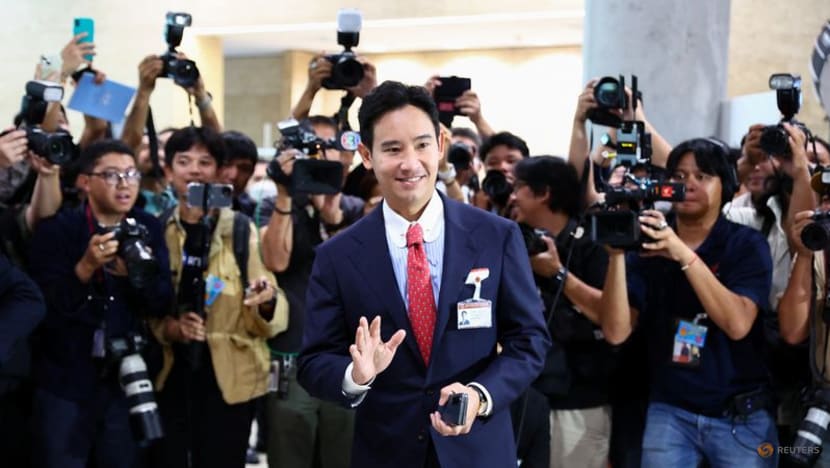Thai election winner Move Forward proposes Bill to cut off senators' power in PM vote
Leader of the Move Forward Party Pita Limjaroenrat failed in his first bid to be elected as Thailand’s 30th prime minister on Thursday.

BANGKOK: Electoral winner Move Forward Party submitted a draft Bill to cut off the Senate’s power in the selection of the prime minister, following its leader’s failure to secure enough votes from a joint sitting of parliament on Thursday (Jul 13).
Move Forward Party members submitted the draft bill to Speaker of the House of Representatives and president of the Parliament Wan Muhamad Noor Matha on Friday afternoon, aiming to revoke Section 272 of the Thai constitution, which empowers the Senate to jointly select the prime minister together with the House of Representatives until May 2024.
“We would like to call it an amendment to the constitution in order to return the power of selecting the prime minister to the people,” said Move Forward Party secretary-general Chaithawat Tulathon.
Members of parliament (MPs) and senators convened on Thursday to vote on Thailand’s next prime minister – two months after the general election on May 14 which saw the Move Forward Party emerge as the winner.
Prime ministerial hopeful and Move Forward Party leader Pita Limjaroenrat was the sole candidate but failed to garner the requisite approval of more than half of the combined assembly.
The assembly comprises 500 MPs from the House of Representatives – the Lower House – and 249 members of the Senate – the Upper House.
For Mr Pita to become the prime minister, he must secure at least 375 votes from the existing members of both Houses.
However, he only managed to garner 324 votes on Thursday, missing 51.
A total of 705 parliamentarians took part in the prime ministerial selection. They included 182 people who voted against Mr Pita and 199 others who abstained.
“It was clear that many senators abstained from voting - 159 of them. Forty three others didn’t join in the meeting. A lot of senators clearly expressed their intention not to use their right or power in the selection of the prime minister,” said Mr Chaithawat.
“If this is to be the case, it will lead to a political deadlock. We, the Move Forward Party, as members of the parliament, are proposing a way out for senators since they don’t wish to use such power.”
The Move Forward Party secretary-general believes that revoking Section 272 of the constitution will provide a way out for both the senators and the parliamentary system.
“This is to enable Thai politics to move forward and to allow for a new government as soon as possible,” he added.
Since the vote to elect a prime minister was unsuccessful, both Houses will reconvene on Jul 19 to revote.
In the event that none of the listed candidates can be appointed for any reason, at least half of the members of both Houses can request the National Assembly to start a process that could allow an “outsider prime minister’”.
ROYAL DEFAMATION LAW
The selection of the prime minister on Thursday was preceded by several hours of debate, which mainly centred on the Move Forward Party’s policy to amend the royal defamation law or Section 112 of the Thai Criminal Code.
Also known as the lese-majeste law, it punishes whoever defames, insults or threatens the king, the queen, the heir-apparent or the regent with imprisonment of three to fifteen years – the same penalty as for involuntary manslaughter.
Mr Pita explained in parliament on Thursday the proposed legal amendment is to prevent the law from being used as a political tool.
Since 2020, hundreds of political activists including children have been prosecuted with the law. Many of them were involved in street protests led by young Thais, who voiced their opposition against the government of General Prayut Chan-o-cha – the caretaker prime minister – and called for various reforms.
One of them is the reform of the monarchy. Demands included reducing the government budget for the monarchy to reflect the economic situation, and abolishing the royal defamation law to allow the public to express their opinions about the institution.
Following the vote on Thursday, Mr Pita said his party intends to maintain its policy on amending the royal defamation law.
UNELECTED SENATORS AND COURT CASE
Several obstacles remain on Mr Pita’s path to the premiership.
One of them is the unelected Senate, whose 249 members were handpicked by the military government of Gen Prayut following his coup d’etat in 2014.
On top of that, Mr Pita also faces possible disqualification of his MP membership after the Election Commission asked the Constitutional Court to rule whether it should be terminated.
The case stemmed from 42,000 shares of media firm ITV, which were held under Mr Pita’s name when he ran in the election on May 14.
The Thai constitution prohibits individuals from running in an election of Members of the House of Representatives if they are shareholders of any newspaper or mass media business.
Mr Pita claimed he managed the shares on behalf of his family’s inheritance fund. He later transferred them to other heirs.
ITV lost the right to use the frequency for broadcasting in 2007. The company and the Office of the Prime Minister are involved in an ongoing legal dispute.
Earlier this week, the Constitutional Court also accepted a petition against Mr Pita and his party, which asked the court to rule whether their proposed changes to the royal defamation law constitute an exercise of the rights or liberties to overthrow the democratic regime of government with the king as Head of State.

















